 CSA-7210
2U 19” Network Appliance with Intel Xeon Scalable Silver/Gold Processors for communications and computing infrastructure deployment
2U 19″ Network Appliance with Intel Xeon Scalable Silver/Gold Processors for communications and computing infrastructure deployment.
CSA-7210
2U 19” Network Appliance with Intel Xeon Scalable Silver/Gold Processors for communications and computing infrastructure deployment
2U 19″ Network Appliance with Intel Xeon Scalable Silver/Gold Processors for communications and computing infrastructure deployment.
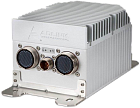 HPERC-KBL-MH
Rugged Convection Cooled System with Intel Xeon Processor and MIL-DTL-38999 Connectors
Inside the tiny footprint of ADLINK’s HPERC lives the power of Intel Xeon processor and optional GPGPU parallel processing engine based on a NVIDIA Quadro MXM module. Dual removable secure erase RAID-0 SSDs provide 12Gb/s throughput and security for deployment in hostile environments.
Easy configuration and expansion allows for fast integration of custom rugged embedded applications. Uniquely-keyed MIL-DTL-38999 connectors provide a wide array of fast IO. The HPERC reserves connector pins for expansion interfaces. The GPGPU sits on a 16-lane 3rd generation PCI Express interface to enable image processing and other applications driven by AI and Deep Learning technologies.
Built with proven Ampro (acquired by ADLINK in 2008) reliability, the rugged capabilities of the HPERC are ideal for ground, air and sea deployments in military and aerospace. The HPERC systems survive shock, resist corrosion and galvanic oxidation, and perform in the humid jungle, the heat of the desert, and the bitter cold of frozen mountain passes.
In addition to Intel’s constantly evolving roadmap, NVIDIA’s many-core GPUs have transformed some areas of sensor processing, including radar, wide-area surveillance, and hyperspectral imaging, due the inherent suitability of parallel processing of those data sets. While this parallel processing paradigm has rapidly increased the processing capability within a given SWaP envelope, the real gains are yet to be exploited — the advent of Deep Learning will likely power the next wave of systems capabilities.
Image processing methods perform operations to enhance an image and/or extract useful information from it. Applications include pattern of life analysis, surveillance, reconnaissance, target identification, and geolocation in GPS-denied areas. For example, to collect tens of thousands of hours of aerial surveillance video and other theaters of operation. Turning what are often grainy, shaky videos taken by drones or satellites into clean image streams suitable for analysis — especially real-time analysis — poses a massive computational burden. According to NVIDIA and Motion DSP, GPUs can process such video seven times faster than CPU-only approaches.
Coupled with NVIDIA’s CUDA graphics processing and the OpenGL API, ADLINK’s HPERC, provides solution engineers with a powerful COTS (commercial off-the-shelf) sub-system with which they can design the next generation of image processing systems. More applications, including:
ISR platforms (intelligence, surveillance and reconnaissance)
Radar processing
Software-defined radio (SDR)
Sonar processing
Forward looking infrared radiometry (FLIR)
HPERC-KBL-MH
Rugged Convection Cooled System with Intel Xeon Processor and MIL-DTL-38999 Connectors
Inside the tiny footprint of ADLINK’s HPERC lives the power of Intel Xeon processor and optional GPGPU parallel processing engine based on a NVIDIA Quadro MXM module. Dual removable secure erase RAID-0 SSDs provide 12Gb/s throughput and security for deployment in hostile environments.
Easy configuration and expansion allows for fast integration of custom rugged embedded applications. Uniquely-keyed MIL-DTL-38999 connectors provide a wide array of fast IO. The HPERC reserves connector pins for expansion interfaces. The GPGPU sits on a 16-lane 3rd generation PCI Express interface to enable image processing and other applications driven by AI and Deep Learning technologies.
Built with proven Ampro (acquired by ADLINK in 2008) reliability, the rugged capabilities of the HPERC are ideal for ground, air and sea deployments in military and aerospace. The HPERC systems survive shock, resist corrosion and galvanic oxidation, and perform in the humid jungle, the heat of the desert, and the bitter cold of frozen mountain passes.
In addition to Intel’s constantly evolving roadmap, NVIDIA’s many-core GPUs have transformed some areas of sensor processing, including radar, wide-area surveillance, and hyperspectral imaging, due the inherent suitability of parallel processing of those data sets. While this parallel processing paradigm has rapidly increased the processing capability within a given SWaP envelope, the real gains are yet to be exploited — the advent of Deep Learning will likely power the next wave of systems capabilities.
Image processing methods perform operations to enhance an image and/or extract useful information from it. Applications include pattern of life analysis, surveillance, reconnaissance, target identification, and geolocation in GPS-denied areas. For example, to collect tens of thousands of hours of aerial surveillance video and other theaters of operation. Turning what are often grainy, shaky videos taken by drones or satellites into clean image streams suitable for analysis — especially real-time analysis — poses a massive computational burden. According to NVIDIA and Motion DSP, GPUs can process such video seven times faster than CPU-only approaches.
Coupled with NVIDIA’s CUDA graphics processing and the OpenGL API, ADLINK’s HPERC, provides solution engineers with a powerful COTS (commercial off-the-shelf) sub-system with which they can design the next generation of image processing systems. More applications, including:
ISR platforms (intelligence, surveillance and reconnaissance)
Radar processing
Software-defined radio (SDR)
Sonar processing
Forward looking infrared radiometry (FLIR)
 HPERC-KBL-MC
Extreme Rugged Cold Plate Mount System with Intel Xeon Processor and MIL-DTL-38999 Connectors
Inside the tiny footprint of ADLINK’s HPERC lives the power of Intel Xeon processor and optional GPGPU parallel processing engine based on a NVIDIA Quadro MXM module. Dual removable secure erase RAID-0 SSDs provide 12Gb/s throughput and security for deployment in hostile environments.
Easy configuration and expansion allows for fast integration of custom rugged embedded applications. Uniquely-keyed MIL-DTL-38999 connectors provide a wide array of fast IO. The HPERC reserves connector pins for expansion interfaces. The GPGPU sits on a 16-lane 3rd generation PCI Express interface to enable image processing and other applications driven by AI and Deep Learning technologies.
Built with proven Ampro (acquired by ADLINK in 2008) reliability, the rugged capabilities of the HPERC are ideal for ground, air and sea deployments in military and aerospace. The HPERC systems survive shock, resist corrosion and galvanic oxidation, and perform in the humid jungle, the heat of the desert, and the bitter cold of frozen mountain passes.
In addition to Intel’s constantly evolving roadmap, NVIDIA’s many-core GPUs have transformed some areas of sensor processing, including radar, wide-area surveillance, and hyperspectral imaging, due the inherent suitability of parallel processing of those data sets. While this parallel processing paradigm has rapidly increased the processing capability within a given SWaP envelope, the real gains are yet to be exploited — the advent of Deep Learning will likely power the next wave of systems capabilities.
Image processing methods perform operations to enhance an image and/or extract useful information from it. Applications include pattern of life analysis, surveillance, reconnaissance, target identification, and geolocation in GPS-denied areas. For example, to collect tens of thousands of hours of aerial surveillance video and other theaters of operation. Turning what are often grainy, shaky videos taken by drones or satellites into clean image streams suitable for analysis — especially real-time analysis — poses a massive computational burden. According to NVIDIA and Motion DSP, GPUs can process such video seven times faster than CPU-only approaches.
Coupled with NVIDIA’s CUDA graphics processing and the OpenGL API, ADLINK’s HPERC, provides solution engineers with a powerful COTS (commercial off-the-shelf) sub-system with which they can design the next generation of image processing systems. More applications, including:
ISR platforms (intelligence, surveillance and reconnaissance)
Radar processing
Software-defined radio (SDR)
Sonar processing
Forward looking infrared radiometry (FLIR)
HPERC-KBL-MC
Extreme Rugged Cold Plate Mount System with Intel Xeon Processor and MIL-DTL-38999 Connectors
Inside the tiny footprint of ADLINK’s HPERC lives the power of Intel Xeon processor and optional GPGPU parallel processing engine based on a NVIDIA Quadro MXM module. Dual removable secure erase RAID-0 SSDs provide 12Gb/s throughput and security for deployment in hostile environments.
Easy configuration and expansion allows for fast integration of custom rugged embedded applications. Uniquely-keyed MIL-DTL-38999 connectors provide a wide array of fast IO. The HPERC reserves connector pins for expansion interfaces. The GPGPU sits on a 16-lane 3rd generation PCI Express interface to enable image processing and other applications driven by AI and Deep Learning technologies.
Built with proven Ampro (acquired by ADLINK in 2008) reliability, the rugged capabilities of the HPERC are ideal for ground, air and sea deployments in military and aerospace. The HPERC systems survive shock, resist corrosion and galvanic oxidation, and perform in the humid jungle, the heat of the desert, and the bitter cold of frozen mountain passes.
In addition to Intel’s constantly evolving roadmap, NVIDIA’s many-core GPUs have transformed some areas of sensor processing, including radar, wide-area surveillance, and hyperspectral imaging, due the inherent suitability of parallel processing of those data sets. While this parallel processing paradigm has rapidly increased the processing capability within a given SWaP envelope, the real gains are yet to be exploited — the advent of Deep Learning will likely power the next wave of systems capabilities.
Image processing methods perform operations to enhance an image and/or extract useful information from it. Applications include pattern of life analysis, surveillance, reconnaissance, target identification, and geolocation in GPS-denied areas. For example, to collect tens of thousands of hours of aerial surveillance video and other theaters of operation. Turning what are often grainy, shaky videos taken by drones or satellites into clean image streams suitable for analysis — especially real-time analysis — poses a massive computational burden. According to NVIDIA and Motion DSP, GPUs can process such video seven times faster than CPU-only approaches.
Coupled with NVIDIA’s CUDA graphics processing and the OpenGL API, ADLINK’s HPERC, provides solution engineers with a powerful COTS (commercial off-the-shelf) sub-system with which they can design the next generation of image processing systems. More applications, including:
ISR platforms (intelligence, surveillance and reconnaissance)
Radar processing
Software-defined radio (SDR)
Sonar processing
Forward looking infrared radiometry (FLIR)
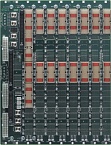 cBP-6108R
8-slot 32-bit 6U CompactPCI Backplane
8-slot 32-bit 6U cPCI H.110 Bus Backplane with Rear I/O.
cBP-6108R
8-slot 32-bit 6U CompactPCI Backplane
8-slot 32-bit 6U cPCI H.110 Bus Backplane with Rear I/O.
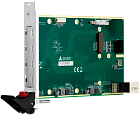 cPCI-A3X10
3U CompactPCI Serial XMC Module Carrier
3U CompactPCI Serial XMC Module Carrier.
cPCI-A3X10
3U CompactPCI Serial XMC Module Carrier
3U CompactPCI Serial XMC Module Carrier.
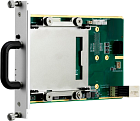 cPCI-A3H10
3U CompactPCI Serial 2.5" SATA Storage Carrier
3U CompactPCI Serial 2.5″ SATA storage carrier with hot-swap support, anti-shock and anti-vibration storage kit.
cPCI-A3H10
3U CompactPCI Serial 2.5" SATA Storage Carrier
3U CompactPCI Serial 2.5″ SATA storage carrier with hot-swap support, anti-shock and anti-vibration storage kit.
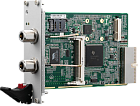 cPCI-3W10
3U CompactPCI Mini PCI, Mini PCIe Carrier Board
3U cPCI carrier board with Mini PCI & Mini PCIe slots.
cPCI-3W10
3U CompactPCI Mini PCI, Mini PCIe Carrier Board
3U cPCI carrier board with Mini PCI & Mini PCIe slots.
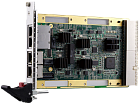 cPCI-3E10/3E12
3U CompactPCI 2/4-Port Gigabit Ethernet Card
The cPCI-3E10 Series is 3U CompactPCI Gigabit Ethernet peripheral card equipped with Intel i210 PCIe Gigabit Ethernet controllers.
The cPCI-3E10 provides four GbE ports on the front panel (RJ-45) with two switchable to the rear transition module, the cPCI-3E12 provides two GbE ports on the front panel (RJ-45), and the cPCI-3E10-SUB provides two Fast Ethernet ports on the front panel (DB-9). OS support: Windows 10.
An optional Rear Transition Module (cPCI-R3E10) is available to provide rear access to the GbE ports switched from the cPCI-3E10 front panel.
cPCI-3E10/3E12
3U CompactPCI 2/4-Port Gigabit Ethernet Card
The cPCI-3E10 Series is 3U CompactPCI Gigabit Ethernet peripheral card equipped with Intel i210 PCIe Gigabit Ethernet controllers.
The cPCI-3E10 provides four GbE ports on the front panel (RJ-45) with two switchable to the rear transition module, the cPCI-3E12 provides two GbE ports on the front panel (RJ-45), and the cPCI-3E10-SUB provides two Fast Ethernet ports on the front panel (DB-9). OS support: Windows 10.
An optional Rear Transition Module (cPCI-R3E10) is available to provide rear access to the GbE ports switched from the cPCI-3E10 front panel.
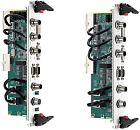 cPCI-RMPSA
6U CompactPCI Rear Transition Module with ruggedized M12 connectors
6U CompactPCI Rear Transition Module with ruggedized M12 connectors.
cPCI-RMPSA
6U CompactPCI Rear Transition Module with ruggedized M12 connectors
6U CompactPCI Rear Transition Module with ruggedized M12 connectors.
 cPCI-8301
3U/6U CompactPCI Single 64-bit PMC Slot Carrier Board
The cPCI-8301 is a standard 3U/6U form factor CompactPCI 64-bit PMC carrier board with one PMC site. It supports 32/64-bit, 33/66MHz PCI buses. It is PICMG 2.0 CompactPCI Specification R2.1 and IEEE 1386.1 PMC Standard compliant.
Note: There is no VIO keying on the cPCI-8301. VIO is directly connected to connector J2 and defined by the backplane. Please check your backplane’s VIO before installing your
PMC card onto the cPCI-8301.
cPCI-8301
3U/6U CompactPCI Single 64-bit PMC Slot Carrier Board
The cPCI-8301 is a standard 3U/6U form factor CompactPCI 64-bit PMC carrier board with one PMC site. It supports 32/64-bit, 33/66MHz PCI buses. It is PICMG 2.0 CompactPCI Specification R2.1 and IEEE 1386.1 PMC Standard compliant.
Note: There is no VIO keying on the cPCI-8301. VIO is directly connected to connector J2 and defined by the backplane. Please check your backplane’s VIO before installing your
PMC card onto the cPCI-8301.
